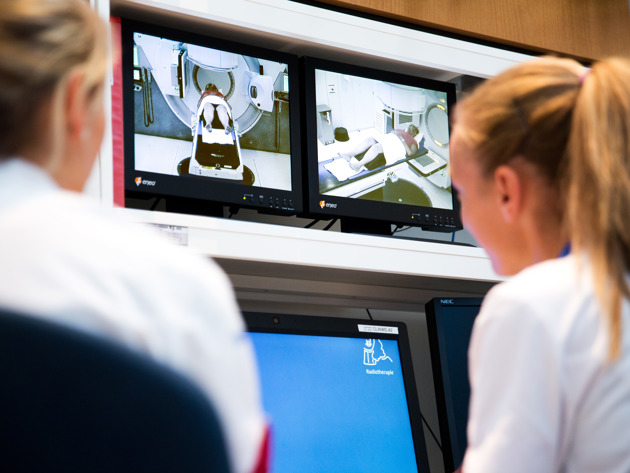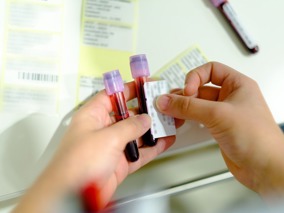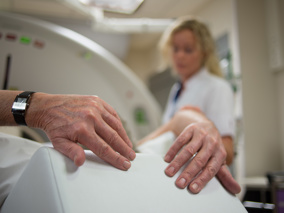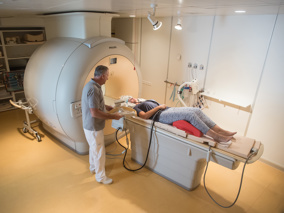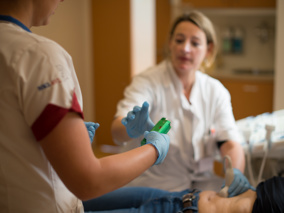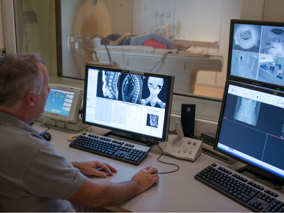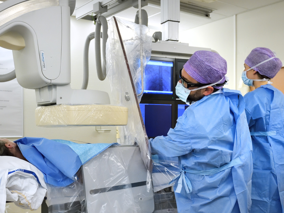Kidney cancer
Kidney cancer is a malignant tumor that originates in the kidneys. This type of cancer is also called renal cell carcinoma. In the Netherlands, about 2600 people a year get this form of cancer. Kidney cancer most often develops in the collection tubes in the kidney. These are small tubes that filter the blood.
Of all kidney cancers, the clear cell type is the most common. 10% of clear cell kidney cancers involve a urothelial tumor, a tumor that originates in the inner wall of the kidney, ureter or bladder. This form is called renal pelvic cancer or ureter cancer. We treat this form of kidney cancer differently. You can read more about this treatment on the page about bladder cancer.
On this page you can read more about the symptoms, examinations and treatments for kidney cancer.
Learn more about kidney cancer
Causes of kidney cancer
Kidney cancer is twice as common in men than in women. People over the age of 45 are more likely to develop kidney cancer. Most patients are between 55 and 80 years old. Smoking, high blood pressure, obesity and hereditary predisposition increase the risk of kidney cancer.
Symptoms of kidney cancer
In the beginning, a tumor in the kidney almost never causes any complaints. Often the doctor discovers the tumor by accident during an ultrasound or a CT scan of the abdomen. If the tumor grows, you may experience symptoms such as blood in the urine, pain in the side or back, or a lump in the abdomen.
In addition to these complaints, you may suffer from:
- prolonged fever
- a feeling of listlessness
- prolonged fatigue for no apparent reason
- Night sweats
- unexplained weight loss or loss of appetite
Why choose the NKI?
Expertise
The NKI is a centre of expertise for kidney cancer and offers the highest quality of care.
Research and care
Research and care under one roof. You will always receive care according to the latest insights, with the possibility of new treatments. You will receive tailor-made advice from us.
Multidisciplinary team
A multidisciplinary treatment team consisting of a urologist, nurse specialist, oncologist, radiotherapist, pathologist, nuclear medicine physician, and (interventional) radiologist will give you tailor-made advice
Treatment options
We offer all possible treatment options.
Supportive care
A lot of attention is paid to supportive care, such as wound nurses, psychological counselling and a smoking cessation clinic within our Quality of Life Centre.
Kidney cancer treatment
The treatment you receive depends on the type of tumor, the size of the tumor, and whether the disease is in one place. Your health and fitness also play a role.
There are two different types of kidney cancer:
- Localized kidney cancer: in this case, the tumor is only in the kidney.
- Metastatic kidney cancer: The tumor has grown to the blood vessels near the kidney, or to the lymph nodes or other organs.
We cover both forms, with appropriate options. At the Netherlands Cancer Institute, we offer all possible treatments.
Waiting
We want to inform you as well as possible about the waiting time per condition. We do this based on a prognosis of the current waiting list. The waiting time can vary from patient to patient for various reasons. Your attending physician will give you more information during your outpatient consultation.
-
11 days
First appointment
This is approximately how long it will take until you have your first appointment
-
10 days
Rapid diagnostics
This is approximately how long it will take before you can start rapid diagnostics at the NKI
-
17 days
Second opinion
This is approximately how long it will take before you come in for a second opinion at the NKI
 nl
nl
